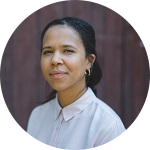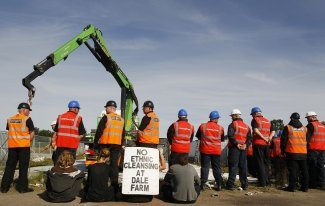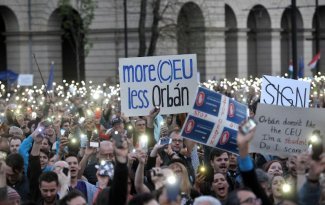
In this photograph taken on 1 February 2023, European Roma Rights Centre director Ðorđe Jovanović addresses a workshop on LGBTQI+ Roma rights in the Balkans, which took place in Madrid, Spain.
The European Roma Rights Centre (ERRC) was set up in the image of the National Association for the Advancement of Coloured People in 1996. Established by former Open Society Foundations (OSF) staffers, the goal was to replicate the US civil rights organisation’s strategy of identifying and taking strategic discrimination cases and cases of rights violations to court, and appealing time after time until Europe’s highest courts would be forced to set the record – and local judges – straight. This is known as strategic or impact litigation.
The ERRC would do this for Roma people, Europe’s largest ethnic minority with a total population of around 10 to 12 million. Roma – an umbrella term for Roma, Sinti, Kale and groups such as Travellers – are amongst the most vulnerable to human rights violations in Europe, according to the European Union Agency for Fundamental Rights, with Roma respondents consistently reporting high levels of discrimination and hate-motivated harassment in consecutive surveys carried out by the agency.
Since being set up in the mid-1990s, the ERRC has won key verdicts around the illegal school segregation of Roma children in the Czech Republic, Hungary and Croatia, the forced sterilisation of Roma women in Hungary, and mob killings of Roma people in Romania. The centre, which relocated its main operations from Budapest to Brussels in 2019, could not have won these victories without the financial support of Open Society Foundations. The private charitable foundation founded by the Hungarian-American billionaire George Soros has accounted for 80 to 90per cent of the organisation’s budget for its EU activities over the last few years.
The ERRC is hardly alone in this regard. EU activism and advocacy around progressive causes has been heavily reliant on philanthropic funding for decades, and OSF funding has been indispensable to scores of civil society groups across Europe. In 2021, its European and Central Asia operations accounted for €209m, or 13.5 percent of its global spending.
We spoke with Ðorđe Jovanović, the Brussels-based director of the organisation about the charity’s recent decision to discontinue much of its funding to EU NGOs and lay off much of its staff on the continent as part of a broader organisational restructuring, and what this will mean for the ERCC and other NGOs with a watchdog role.
What impact will OSF’s decision to scale back its funding for European initiatives have on the ERRC?
Our organisation received funding under OSF’s human rights programme, a programme that was already closed two years ago. Like many other organisations [that were funded under this programme], we received one final grant at that time. The only funding we have received since has been a very small grant of around US$15,000 (€14,172) to contribute to our already existing work on monitoring Roma rights during the war in Ukraine. But if they had stayed in the European Union, we might have been able to apply for funding under some of their other programmes, for example, their LGBTIQ programme. But since they are closing everything, of course, that is going to affect not just us, but everyone else.
We were the first strategic litigation organisation to be set up in Europe, so we have accumulated a lot of knowhow and knowledge. So, I think we’ll be able to bridge this funding gap and perhaps attract new donors. But the hundreds of small organisations that received funding from Soros will probably die. They are so small that they cannot access EU funding directly. We’ve already seen this in many countries, where we no longer have local partners to cooperate with. Our base is in Brussels, so we cannot litigate in Bulgaria and Romania without local partners, for example.
But even if this foundation is called Open Society Foundations, we should not forget that this is a private foundation and it is their decision. From an operational point of view, I perfectly understand why they would want to cut some of the programmes. If you think globally, and you look at indexes on the state of democracy, their help might be more needed in other places. There are regions in Asia and Africa where human rights defenders are frequently killed and jailed, where they are considered to be ‘foreign agents’. Luckily, we don’t have that in Europe.
Since the news about the foundation’s restructuring came out in August, OSF has announced they’ll spin off their support for Roma communities in Europe into a new, Brussels-based Roma Foundation for Europe and simultaneously pledged €100 million for this new organisation. What will this mean for the ERRC?
At this point, we don’t know. According to news reports, they will be operational from next year. So, we will have to wait until then to know what will be the scope of this foundation, what will be their targets, what do they want to do, and is there common ground for cooperation. A lot of the funding we previously got from OSF was by invitation, so we were invited to apply as opposed to them putting out open calls. Will [the Roma Foundation for Europe] have open calls? Will they cover human rights at all? Or will they focus on something else? We will have to wait and see.
Why do you think the grant-making organisation has decided to continue funding Roma initiatives, while limiting its funding to other European NGOs?
I think this is the legacy of George Soros, who Is personally very interested in Roma issues in Europe. This was something he started and his heart was always close to this topic, very similarly to the Central European University, which they also announced they will continue funding, even though they have had to move from Hungary to Vienna. He has also said in the past that his creation of the Roma Education Fund is one of his proudest achievements.
How important has OSF funding been to the legal victories you’ve won?
It has been crucially important because there is literally no other donor in Europe which funds strategic litigation. Funding from the European Commission for instance explicitly mentions that their funding cannot be used for litigation costs, or court or lawyer fees. Soros’ funding allowed organisations to function as US-style watchdogs, and that’s because the foundation was American. European Commission funding tends to be subsidiarity funding, where they give you money to do something which EU countries or the European Union cannot do. For instance, they might say: ‘Here’s some money to develop a programme to employ Roma because you are better placed to do this than any of the state agencies’. EU funding wants non-confronting activities. They want you to find and share best practices, to do research and [gather] new data. The funding we had from Soros was for hard watchdog activities, where you say: ‘What you’re doing is illegal’ and you take the whole state apparatus to the court.
Additionally, their support enabled us to initiate small, innovative pilot projects that many other donors are reluctant to finance. Many donors are hesitant to invest in initiatives that may not yield immediate results. This often limits opportunities for organisations like ours to engage in innovative or exploratory projects that could have a long-term impact but require a more flexible funding structure.
Wasn’t the funding also important because going to court costs so much money?
It’s not just that that it costs a lot of money, it also lasts a long time, and you need to maintain a relationship with the litigant whom you are representing. In our case, we were often defending Roma people who have been evicted from their homes, which means they would change address or move to another country. Or, take the children who were segregated in schools when they were eight years old. When the case was finally decided, they were 15.
Monitoring and documenting violations also takes a lot of time. To convince Roma who have been discriminated against to go in front of a judge and tell their story, you need to work with them, explain to them, encourage them. And in most cases, the authorities will be believed rather than Roma, who are often portrayed as lying.
The whole idea of strategic litigation is not just important from the perspective of winning victories. It is also important from the perspective of our experience in Europe being written into official records of state courts. Because otherwise, in the future, it will be our word against that of the then-politician. And when they’ll say that they tried to help Roma attend school, we can say: ‘No, that’s not true. There is a decision from a court in [your country] which confirms that there was ethnic segregation.’
What impact do you think that the support of Roma rights in Europe is likely to have against the general deterioration of democracy and rule of law that we’ve seen globally?
It always has a huge influence. Authoritarian regimes obviously don’t care much about the rule of law. Just look at Russia’s decision to withdraw from the Council of Europe, which means that they’ll also ignore the European Convention on Human Rights. They also do not acknowledge the European Court of Human Rights. So, it’s obviously a step back. Or, take [Hungarian Prime Minister] Viktor Orbán who has organised national consultation campaigns, sending letters to each household in Hungary, asking questions on anti-immigrant, anti-Soros and anti-LGBTIQ issues. So, if you think about the decline of democracy, that’s always bad for minorities because right-wing parties are usually against minorities and minority rights. There is this social contract around the protection of minorities which they do not respect, with rhetoric that minorities have more rights than anyone else, not just Roma but all ethnic minorities and LGBTQI+ minorities, etc.
If you look at the Roma and Roma rights, they can be a good indicator of the level of democracy in those states. Because if you have someone from a marginalised group, and that person can access the courts, and those courts are independent and can bring decisions in favour of these most unprotected people, that means that the judicial system is really independent from the executive power.












